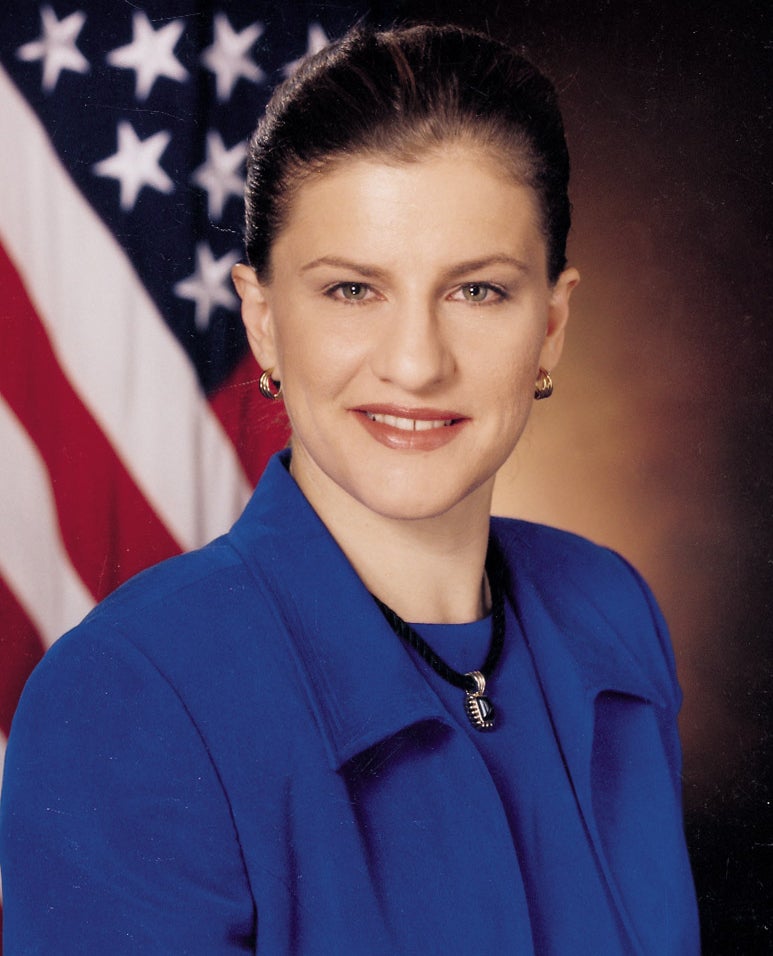Ana Maria Salazar ’89 always notices the surprised looks. Salazar, deputy assistant secretary of defense for drug enforcement policy and support, gets that reaction often on the job. Someone in her position is not supposed to be a civilian, not supposed to be young, not supposed to be a woman. But, as a Mexican American woman who easily traverses different cultures, she knows her presence at the table helps many countries stem the spread of drugs.
“It’s surprising for them to see a woman walk in heading a delegation of generals and colonels and uniformed men and women in the different services, but at the same time, I come in, I speak the language and understand them,” said Salazar. “Being bilingual and bicultural has been one of the most important assets I bring.”
As the manager of a billion-dollar annual budget, Salazar oversees the Department of Defense’s counterdrug program in the United States and more than 20 other countries. The program includes training and equipment for the National Guard; drug testing within the U.S. armed forces; radar and air surveillance on the U.S. border and in Mexico and Caribbean countries; and military assistance to help countries fight drug production within their borders.
She gained her position—the civilian equivalent of a three-star general—in July 1998 after proving herself in a country that is a focus of U.S. interdiction efforts. At HLS, Salazar worked with Professor Philip Heymann ’60 at the now-defunct Center for Criminal Justice, which inspired her interest in international judicial systems. After receiving a grant to train judges and prosecutors in Guatemala, she moved on to Colombia, serving as judicial attaché at the U.S. Embassy in Bogotá when the Medellín drug cartel was routinely murdering law enforcement officials in that country.
“When I told my relatives, my friends, and my coworkers I was going to Colombia, their immediate reaction was ‘You’ve got to be crazy,’” Salazar said. “It was a very difficult time for Colombia, but that’s why at the same time it was important for someone like me to go down, because at that point the U.S. had committed itself to providing a relatively large [financial aid] package to Colombia.”
Salazar, who also has held positions in the White House and State Department, recently spoke before Congress to campaign for a $1.3 billion aid package to Colombia, which was later passed. She also was involved in the preparation for President Clinton’s trip to Colombia in late August. It is the responsibility of the United States to help the country, she said, “because we do consume those drugs.” Without the aid to Colombia, “we can almost guarantee the situation will get worse. More drugs will be produced and those drugs will be on our streets.”
Although her department concentrates on reducing the supply of drugs, Salazar emphasizes that the Clinton administration has worked to reduce demand as well.
“The statistics show that if kids don’t use drugs, they’re probably not going to use them as adults,“ she said. “So all the money we could put into that, and have good programs so that kids will not use drugs and will not become addicts, I think is a good investment.”
A political appointee, Salazar may leave her job with the arrival of a new administration. No matter what she does, however, she knows her focus will remain on the issues of drugs and justice. She understands the concerns and problems of Latin America and the United States, she says. Her background and experience—from parents who raised their children to speak English and Spanish, to HLS, to the streets of Colombia—have prepared her for the battles she’s fought, and for the battles ahead. “If you had told me ten years ago I would be in the Department of Defense, I would have probably laughed. But now that I’m here, it just makes perfect sense,” she said. “It just goes to show in the United States that, given the opportunity, people like me get to do very interesting things.”
